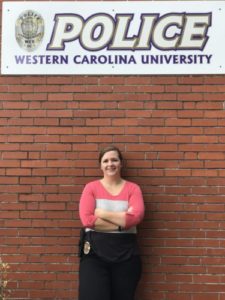This story was co-written with Sydni Hall.

WCU alumna Detective Brittany Thompson outside of the WCU Police Department. Picture by Sydni Hall
WCU alumna Brittany Thompson shares her experiences, hardships and favorite moments as the detective for the WCU police department.
Graduating in 2011, Thompson double majored in criminal justice and forensic science. She completed her internship at the State Bureau of Investigation. Her goal was to work with the SBI as a crime scene investigator. She started working at WCU in 2012 to gain experience for her desired police career but has “completely fallen in love” with her job.
“I didn’t think I would love it as much as I did…I love interacting with victims, seeing their process, and watching them grow,” says Thompson. She recounts instances she had with prior victims of crime that overcame the challenges they faced in school. Being able to watch their progression and seeing them cross the finish line at graduation is very “rewarding,” says Thompson. However, there is much more that comes with her job.
According to the University Police’s Frequently Asked Questions page,
“WCU police department consists of 18 police officers…Once employed, a university police officer must attend a regional police academy where he or she trains along with law enforcement officers from local or state law enforcement agencies. Once a university police officer has successfully completed the Basic Law Enforcement Training academy, once he or she passes a statewide examination before the North Carolina Attorney General’s Office, they are then certified as a law enforcement officer.”
Thompson goes into detail about the work she is required to handle as a detective on a college campus. She is responsible for investigating all crimes reported and committed on WCU’s campus, but her primary case investigations are on sexual assaults and drug and alcohol violations.
“The majority of the time I interact with the victims, help them get their voice, and guide them through any court proceedings they may be involved in… A lot of times, 18 and 19 year old’s have not been involved in the court system,” says Thompson. She explains that one of her roles include helping students with court proceedings and legal processes.
As a law enforcement officer there are many regulations Thompson is required to follow, however, being on a college campus requires more scrutiny than normal police settings. College law enforcement is set apart from local or city police departments due to their requirements to follow the Clery Act and Title IX regulations.
According to the End Rape on Campus organization, the Clery Act is a federal law requiring U.S. colleges and universities to disclose information about crimes reported and committed on their campuses.
Under the Clery Act, colleges and universities are required to follow specific policies regarding sexual assault reports, including:
- Publish an annual security report
- Disclose crime statistics for incidents that have occurred on/near campus
- Issue timely warnings about Clery Act crimes that may threaten students or employees
- Devise an emergency response, notification and testing policy
According to the U.S. Department of Education, Title IX “protects people from discrimination based on sex in educational programs or activities that receive Federal financial assistance.”
Protected groups and areas under Title IX regulations include the following:
- Recruitment, admissions and counseling
- Financial assistance
- Athletics
- Sex-based harassment
- Treatment of pregnant and parenting students
- Employment
Thompson is a major advocate for student safety on campus. She gives advice to young men and women about how to stay safe not only while on a college campus, but in general when they are out and about. Thompson suggests that students should be cautious by locking their doors, going out in groups, and always letting someone know where you are and where you are going.
Thompson plays a major role as detective of the WCU police force. She wants to continue her career at Western Carolina and does not plan on leaving the force. Thompson is passionate about the work she does and loves to give advice to aspiring police officers.
“Being a police officer is a very rewarding job. It can be difficult at times, but stick with it, and in the end, you will be able to make a difference in people’s lives,” says Thompson.
Hear more of Brittany’s story in the video below.


